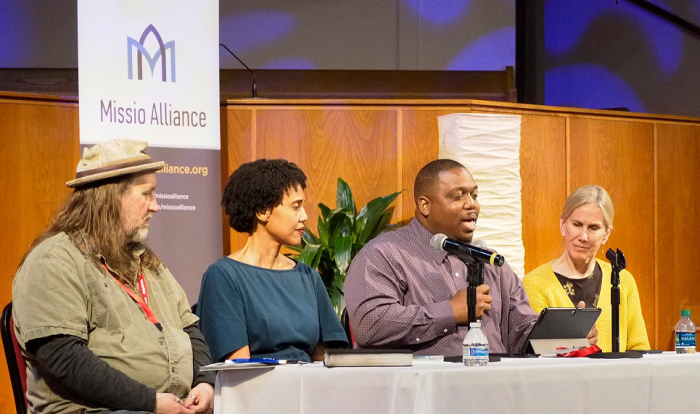White people should start joining majority black churches, says multiethnic ministry director

ALEXANDRIA, Virginia — If racial reconciliation is to ever occur within the American church, more white people need to make the "leap" to join majority black churches, speakers at Misso Alliance's Awakening Conference advised.
There also must be a greater understanding of both the black and white church and a re-examination of the dynamics that make multiethnic churches successful, said pastors and theologians during a Friday panel discussion at Alfred Street Baptist Church. Multiethnic congregations are not a boutique enterprise, they stressed, but something vital to the witness and mission of the church of Jesus Christ.
Santes Beatty, director of multiethnic ministries at the Wesleyan Church World Headquarters, noted that the effort to make the church more multiethnic has noble goals and its churches have benefited from the lifeblood of the black church — the minds, the culture, and the experiences of the people it envelops. But the black church hasn't always benefited.
Explaining the history of how the African Methodist-Episcopal Church began, Beatty noted that "the black church was a critique of the white church, and an affirmation of the intrinsic value of [their] black leaders."
All of the historically black denominations like the Church of God in Christ, Full Gospel Baptist Church Fellowship and the AME Church have, over the years, demonstrated three things, he said: "faithfulness to the Gospel in the midst of suffering, inclusiveness or openness to the other in the midst of oppression, and the capacity to speak with power from the margin."
"It was one of the few places [in society] where black people were in the majority by choice," Beatty said, noting that its greatest strength could also be its greatest threat and it risks becoming an idol.
Yet, among black Christians, skepticism about the multiethnic movement remains, he continued, given the lack of blacks leading multiethnic congregations. The default seems to be blacks leaving their churches to join mostly white churches to help them transition to multiethnic and not the other way around.
For the movement toward greater ethnic diversity in the church to succeed, "we'll have to admit that parts of the multiethnic movement have traces of white supremacy," he argued, which is the idea that white people are inherently superior in intellect, beauty, character, culture and ability.
The ideology is not limited to white people, he added, as people of color can also espouse it. In practice, it manifests itself as the "right way," the best standard to which everyone should aspire and this has to be named accurately in order for it to be addressed.
"People of color can smell traces of white supremacy a mile away," he said.
Beatty quoted a black leader from North Carolina who noted that "when you are in a minority in every other area of your life, going to a majority church is just another step. But when you are in a majority in every area of your life, going to a minority church is not a step, it is a leap."
"I believe part of the challenge that we must engage is more white people need to be willing to make that leap."
Mary Kate Morse, a professor of leadership and spiritual formation at Portland Seminary in Oregon, shared how the civil rights era began soon after she received Christ. She excitedly invited a black friend to a church that was all white. The friend expressed reservations and hesitated but went anyway.
On Monday morning, the black friend was told by someone in authority that she was not to go back to the white church because her presence made the white worshipers uncomfortable. Morse, appalled, went down the street to the black church where she was warmly welcomed the following Sunday.
That instance and decades of subsequent experiences precipitated the recognition that she had blind spots in her perceptions about life, something every human being experiences. It got her to thinking about the key things that cause human beings to immediately call into question who is worth their time, who they will value and why. She came to the conclusion that this was the "kernel thing," the "core sin" in the Garden of Eden, the desire to be superior over another.
"We wanted that positioning, that we would be the definers, that we would be able to say what things looked like and didn't look like, that we would say what was right and what was wrong."
As the core sin entered into the picture, humans started categorizing race, age, gender, education level and socioeconomic status, creating hierarchies where they did not exist previously.
"We all do it. And so at the base of our discussion of multicultural in the church, we have to embrace that we all have sinned and fallen short of the grace of God, that we all calculate our place in the group and try to secure it even at the expense of someone else."
The process of discovering and addressing these blind spots is an ongoing one, she said.
The Awakenings Conference was a three-day event that concluded Saturday.




























